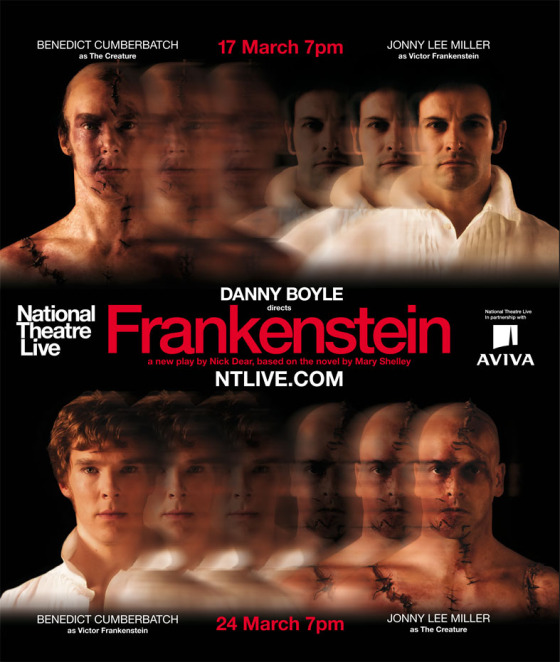
Ever since I took a Gothic Literature class at Uni back in 2000, I’ve been a massive fan of Mary Shelley’s classic novel Frankenstein. Second only to Bram Stoker’s Dracula, it represents all that I love about good storytelling - an examination of the human condition through the experiences of an extra-ordinary creation, in this case Victor Frankenstein’s Creature. It’s a tragic tale, one that has sadly been so maligned by various Hollywood film treatments (which lead to the curious case whereby people assumed the Creature was the one called Frankenstein). So when I discovered that the National Theatre would be staging a production of this classic tale, directed by none other than Danny Boyle, and starring Beneditch Cumberbatch (fresh from his success on the recent Sherlock revival), well, I was always going to be seeing this, no matter what!
The plot of Frankenstein should be familiar to anyone who enjoys classic literature, but just in case you’re not aware of it, here’s a quick run-down. Victor Frankenstein, a brilliant scientist who seems to enjoy dabbling in the more esoteric areas of research, creates an artificial lifeform - the Creature. This Creature is a fully formed male adult, but lacks any knowledge about language or history. Quickly shunned by his creator, the Creature escapes into the wider world in search of a life. A child at heart, he quickly realises that the world around him will never accept him, because of how he looks. Learning quickly about the evil of mankind, the Creature vows to return to the home of Frankenstein, and plead his simple case - get a mate created for him, so that the two may live a life of happiness away from a hateful society. If only things were that simple…
This is the ultimate of all tragic tales. Despite the title of the play, the lead character here is very much The Creature, and his place in society is quickly established as one that pits him as the ultimate outsider. Essentially anyone with working eyes shuns him, with the only person to offer him any kindness is a blind old man who teaches him a lot about the way the world operates. As the narrative unfolds, it becomes more and more difficult to side with anyone but the Creature, as he suffers insult after insult, rejection after rejection. Despite starting the story as a kind-hearted child, he quickly moves from that to educated scholar, then into his final transformation as a creature filled with resentment and hate for the life he has been forced to live. Not because of anything he himself has done, but rather because of how others have treated him.
It’s a strong narrative, and one that has very much stood the test of time. Not only does the very moral story at the centre still resonate and connect with an audience after more than a hundred years, but also the tale of science being taken down a very dark path. This is so relevant on so many levels, especially when you consider what human society is so capable of now, what with stem cell research and human cloning. Sure, Mary Shelley had to craft a story in which lightning is used to bring the Creature to life, but if anything this story is more possible now than what it was a century ago. There’s a lot here to digest, and deserves a very thorough reading by anyone interested in morality tales.
I expected big things from Director Danny Boyle, and I was never disappointed. Not only does he nail the casting here, but he does so in a very interesting way. Both Jonny Lee Miller and Benedict Cumberbatch are fantastic British actors, and so it was lovely to see the pair of them working together. It’s here that we find the interesting twist in the tale - depending on which performance you view, one of them will be playing Frankenstein, the other the Creature. Then it changes for the next night, and so on. A gimmick, maybe, but it does help to really reflect the way in which these two characters are two sides of the same coin. I saw Benedict as the Creature, and Jonny as Frankenstein. Wish I could have seen it the other way around, but in this form it worked. Lovely performances from the pair of them. Not a single thing I could fault on any level at all.
The production design of the entire show was nothing short of majestic. Opening with a gorgeous open space, in which the Creature is “birthed” out of something approaching an amniotic sac, the space of the National Theatre is transformed with each scene to beautifully reflect the various locations present in the text. Whether it is a bridge over a river, the icy tops of the Artic Circle, or a strip of grass representing farming land, the entire production design is beautiful and well executed. Even the lighting is done in an interesting way, with a large collection of golden light globes hanging over the stage space and being used for a variety of purposes throughout the course of the show. A lovely set of aesthetic choices, and I fell in love with each and every one of them from the outset.
Overall, I came away from Frankenstein feeling very satisfied indeed. All of my misgivings following on from the recent NT Live production of King Lear vanished in a moment, and I am now a much bigger believer that live theatre can indeed be presented as a filmed product. This was a gorgeous production, and I implore anyone and everyone to find a way to view this amazing piece of theatre in whatever way you can. Could this be the definitive production of Frankenstein? For this generation, and maybe even the next one, I do believe so. Fantastic work from all.